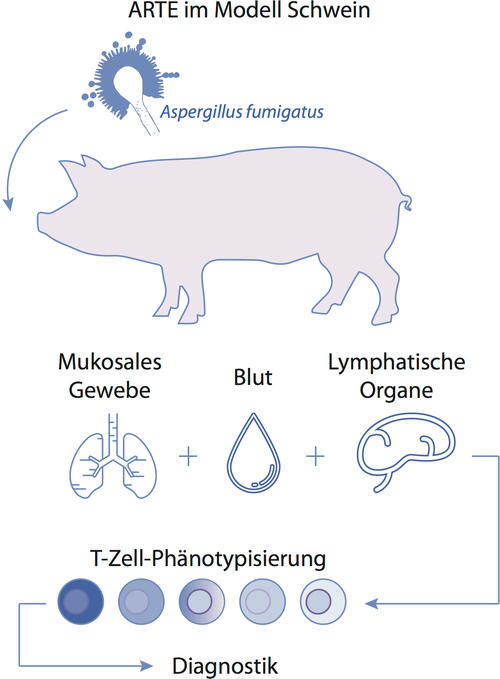Establishing of immunological tools in pigs
Antigen-specific T cell analyses in blood and tissue via the „Antigen-reactive T cell enrichment“ (ARTE, Ebner et al. 2017).
Image Credit: Institut für Immunologie
In order to analyse T-cell subpopulations in pigs in different chronic diseases as well as during infections we developed a verification method to detect the lineage-specific Th1 and Th2 transcription factors GATA-3 and T-bet in pigs (Ebner et al. 2014). Moreover, we are working on the detection of antigen-specific T-cells in pigs. Using the marker CD154, pathogen-specific T-cells can be detected during the onset of an infections with e.g. Ascaris roundworms or Aspergillus fungi (figure). As a consequence, antigen-specific T-cells in the pig are directly detectable ex vivo. The pig is hence an exquisite model for the characterization of pathogen-specific T cells in infections relevant to humans. It furthermore allows the assessment of the distribution of antigen-specific cells within the different organs and tissues of the host.
Publications:
-
Ebner, F., S. Rausch, L. Scharek-Tedin, R. Pieper, M. Burwinkel, J. Zentek, S. Hartmann. 2014. A novel lineage transcription factor based analysis reveals differences in T helper cell subpopulation development in infected and intrauterine growth restricted (IUGR) piglets. Developmental and Comparative Immunology, 46:333-340.
-
Ebner, F., P. Schwiertz, S. Steinfelder, R. Pieper, J. Zentek, N. Schütze, C. G. Baums, G. Alber, P. Geldhof, S. Hartmann. 2017. Pathogen-reactive T helper cell analysis in the pig, Frontiers in Immunology, doi: 10.3389/fimmu.2017.00565.
Associated scientists: Dr. Friederike Ebner, Dr. Josephine Schlosser, Stefanie Schmidt, Lisa Käbisch.
Third-party funds: BMBF InfectControl, Projekt Art4Fun.
